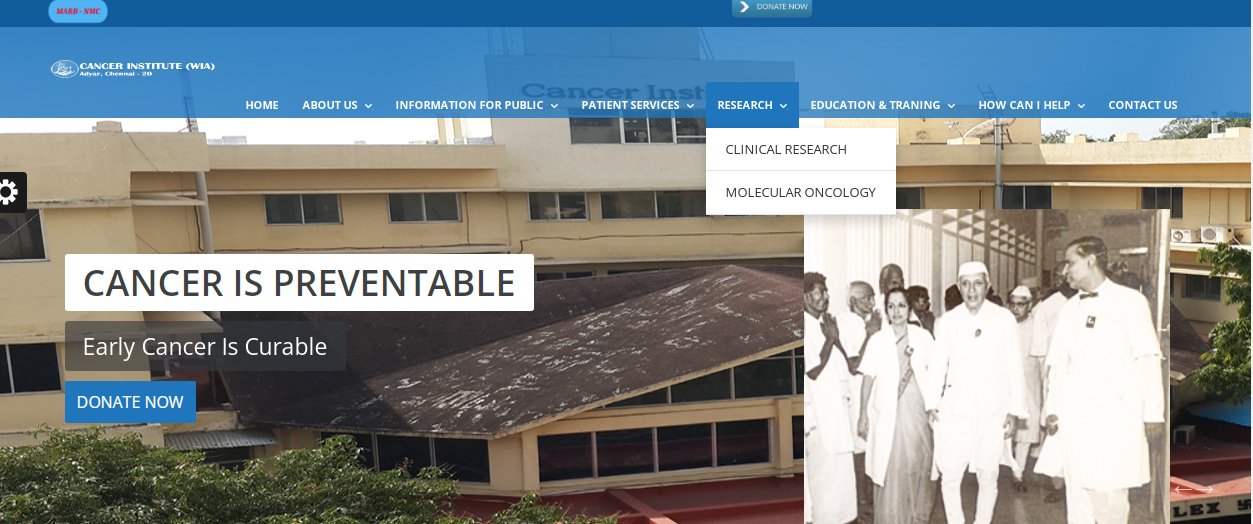
Regional centre for Cancer Research and treatment,Adyar,Chennai
The Cancer Institute (WIA), as you are aware, is a public charitable voluntary institute dedicated to the care of cancer for for the last 60 years.
The Institute is a comprehensive cancer centre comprising of a hospital of 535 beds, a research division, a college of oncological sciences and a division of preventive oncology and provides state of art treatment to one and all.
It has both a National and International stature.
Of the hospital beds, only 40% are paying beds and the remaining are general beds where patients are boarded and lodged free of cost. 40% of the patients are treated totally free and remaining patients pay a norminal amount.
Annually, over 15,672 new patients and 140,935 follow up cases are seen at the Institute.
Mission Statement
The Cancer Institute (WIA), Chennai was established more than 50 years ago by the Womens' Indian Association Cancer Relief Fund under the leadership of Dr. Muthulakshi Reddy, as a "mission" to provide scientific treatment and promote health education amongst all sections of people. The ethos of the Cancer Institute (WIA) is "service to all" irrespective of social or economic class. It was established in the faith that selfless service would generate its own strength and funds would always be found. The Institute will not be confined to the four walls of a multi storey building but will strive to reach out to every nook & corner of the state. The Cancer Institute (WIA) shall aspire to be a symbol of man's eternal quest to conquer disease and an inspiration that reaches out to humanity.
DM - Oncology
Regional centre for Cancer Research and treatment,Adyar,Chennai
Certainly, let's discuss Oncology. Oncology is the medical specialty focused on the prevention, diagnosis, and treatment of cancer. Oncologists are physicians who specialize in oncology and work in collaboration with other healthcare professionals to provide comprehensive care for cancer patients. Here are key aspects of Oncology:
Prevention:
- Oncologists emphasize preventive measures to reduce the risk of developing cancer. This may include lifestyle modifications, vaccination (e.g., HPV vaccine for cervical cancer prevention), and screening programs.
Cancer Diagnosis:
- Oncologists use various diagnostic tools, including imaging studies, biopsies, and laboratory tests, to accurately diagnose and stage cancer.
Tumor Boards:
- Multidisciplinary tumor boards bring together oncologists, surgeons, radiologists, pathologists, and other specialists to discuss and collaboratively plan the best treatment approach for individual cancer cases.
Treatment Planning:
- Oncologists develop personalized treatment plans based on the type and stage of cancer, as well as the patient's overall health. Treatment modalities may include surgery, chemotherapy, radiation therapy, immunotherapy, hormone therapy, targeted therapy, or a combination of these.
Surgical Oncology:
- Surgical oncologists specialize in the surgical management of cancer. They perform biopsies, tumor removals, and other surgical procedures to treat or diagnose cancer.
Medical Oncology:
- Medical oncologists focus on the use of systemic therapies such as chemotherapy, immunotherapy, targeted therapy, and hormone therapy to treat cancer.
Radiation Oncology:
- Radiation oncologists use radiation therapy to target and destroy cancer cells. This may involve external beam radiation or internal radiation (brachytherapy).
Hematology-Oncology:
- Hematologist-oncologists specialize in the treatment of blood cancers, such as leukemia, lymphoma, and myeloma, as well as other hematological disorders.
Palliative Care:
- Palliative care specialists work in conjunction with oncologists to provide supportive care and improve the quality of life for patients with advanced or terminal cancer.
Clinical Trials:
- Oncologists may recommend participation in clinical trials to explore new and innovative treatments, contributing to advancements in cancer care.
Genomic Medicine:
- Advances in genomics allow oncologists to analyze the genetic makeup of tumors, guiding treatment decisions and identifying targeted therapies.
Cancer Survivorship:
- Oncologists provide ongoing care and support for cancer survivors, addressing long-term effects of treatment and monitoring for potential recurrence.
End-of-Life Care:
- Oncologists, along with palliative care specialists, assist patients and their families in making decisions about end-of-life care and providing compassionate support.
Patient Education:
- Oncologists play a crucial role in educating patients about their diagnosis, treatment options, and potential side effects, empowering them to make informed decisions about their care.
Oncology is a rapidly evolving field with ongoing research and advancements aimed at improving outcomes for cancer patients. If you have specific questions about oncology or if there's a particular aspect you'd like more information on, feel free to ask.
M.Ch - Surgical Oncology
MD - Radiotherapy/ Radiation Oncology
- Log in to post comments
- 73 views
